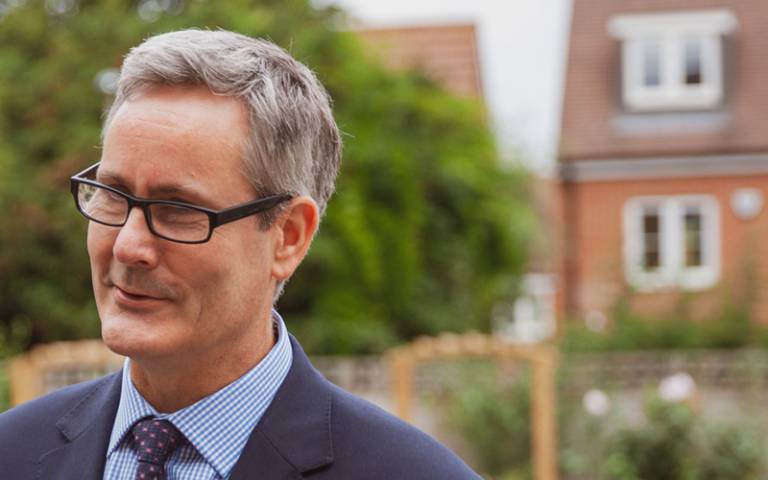Meeting Paul Hackett: we talk solutions for affordable housing with our new Honorary Professor
17 May 2019
Paul Hackett, CEO of Optivo and Chair of G15, was recently appointed an Honorary Professor of The Bartlett School for Construction and Project Management, and is a new member of the School’s Independent Advisory Board.

Paul Hackett has an established career in the housing industry and has recently joined the School in an honorary and advisory capacity. We sat down with Paul to talk about what inspired him to work in housing, what he hopes to achieve in his new appointments, and what is currently on top of his to-do list.
How did you get into housing and development?
I had a bit of a life changing experience in my early 20s. A friend and I went travelling around India in the late 1980s. I had never left the UK prior to that trip. We arrived in Mumbai in the middle of the night and got a taxi from the airport to the hotel. As the taxi pulled out, I saw families sleeping on the pavements and central reservations of these massive dual carriageways the entire journey. And when we were leaving Mumbai by train to head north a few days later, as we left the central business district, we passed through 13 to 14 miles of continuous slums. It completely shocked me.
This experience had a really profound effect on me. I’d led quite a sheltered life until that point. It made me think that when I come back to the UK and graduate, I want to do something with my life that’s worthwhile.
When I graduated, I worked as a volunteer with a youth homelessness charity, helping young people in Bradford in West Yorkshire, where there’s a lot of poverty. I loved helping young people to find housing solutions, and from that I got a job as a housing trainee with a housing association in Manningham. That was thirty years ago and since then I’ve loved every day working in housing. It’s a wonderful sector to work in. It’s a really interesting combination of built environment issues and human issues. At the end of each week when I go home, I find it very rewarding knowing that we’ve helped hundreds of families by giving them the keys to a home and improved their lives. It’s also really rewarding to be able to drive around the country and see schemes that I’ve built over the decades knowing that people have had some of their big life moments in those homes.
Have you always been involved with the Bartlett School of Construction and Project Management?
My first involvement was at the Case of the Affordable Housing symposium last year. I really enjoyed being part of the discussions which was about equity vs debt, new ‘for-profit providers’ vs traditional ‘not-for-profits’. Given the UK has the worst housing crisis since the Second World War, it’s really important that practitioners and policy makers think outside the box. Academic institutions like The Bartlett are in a fantastic position to ask the big questions, to look beyond the UK, to look globally at different ways of doing things. Following the symposium I was contacted and asked to join the Independent Advisory Board, so that was really my first introduction to the School.
What would you like to achieve during your time at the School?
I’d like to achieve a few things: firstly to give something back to the built environment industry in its wider sense. Secondly, to contribute to the discussions and debates about modernising the industry. Thirdly, and probably for me the most important thing, raising the profile of affordable housing within the School and within the wider built environment industry.
Affordable housing is a rapidly growing asset class in its own right. As owner occupation becomes harder to attain for so many people, and with the growth of both the affordable housing sector and the build-to-rent sector, there has been a change in the way we think about housing in the UK. With 2019 being the Bartlett’s centenary year, now is the perfect time for the School to think about how the UK housing industry will change over the next 100 years.
The Bartlett is the best built environment school in the world so it’s a great honour to be involved. I’d like the opportunity to work with the School to think about the future of affordable housing. I’d like the School to support research into how housing could be viewed more like long-term infrastructure. By taking a longer term approach to funding, could we expand the productive capacity of the UK homebuilding industry? At the moment government investment in housing is short-term (annual, or two or three year cycles). This creates inefficiencies and means the affordable housing sector competes with the private sector for scarce land, labour and materials.
What would you say are some of the challenges facing affordable housing and social housing today?
Under-supply of affordable housing is the main housing challenge facing the country today. According to a recent study by Heriot-Watt University, we need to build 145,000 affordable homes each year for ten years to overcome the historical back-log. At the moment, we’re struggling to build 45,000, so we’re falling a long way short. However there have been times when the UK has managed to sustain build programmes at or above this volume. With political will and a fresh approach to planning and funding affordable housing we could do it again. I’m keen to work with colleagues at The Bartlett to explore solutions to achieving this goal.
Another challenge we’re facing is a rapidly ageing UK construction workforce. Every time the housing market goes into recession, thousands of construction workers leave house building – and by the time the housing market picks up again these workers don’t return. At the moment, about half of all UK homebuilders are over the age of 45. We need to modernise the construction industry and embrace off-site manufacturing. We simply don’t have a large enough construction workforce to build the 300,000 homes the government say we need to build each year.
Looking beyond the UK, there are a billion people living in slums globally. The world is going through a period of unprecedented urbanisation and one of the biggest challenges facing politicians and policy makers in the 21st century is addressing the global affordable housing crisis. I recently became a non-Executive Director of an organisation called Reall Equity for All. Our aim is to build an affordable housing movement to help 100 million people in the global south access affordable housing by 2030.
Do you have any thoughts on the solutions to these challenges?
In the UK, I think we need to take a longer term view about the way we plan for and fund affordable housing. As we saw in the global financial crisis and in previous recessions, house price bubbles can have a destructive effect on economies. We need to find ways to smooth the boom and bust cycles that characterise the UK residential sector. I also think we need to modernise homebuilding – how can we develop the supply chain, grow and sustain off-site manufacturing and develop more diverse delivery models that meet a wider range of needs and ultimately, expand the productive capacity of the construction industry?
Last year, housing associations spent £10.7 billion on new build. The construction industry is atomised, with an over-dependence on trade skills, under-capitalisation and poor productivity growth compared to other industries. With this level of investment in affordable housing there must be more that could be done to improve efficiency, quality and value for money. I would like to see more collaboration and a greater emphasis on innovation and R&D.
I would also like a greater understanding of the role that affordable housing investment can play in improving productivity in the wider economy. I would like to see more joined up thinking between housing and infrastructure investment and a better use of the planning system to capture land-value uplift.
At a global level I believe there is an enormous opportunity to connect investors looking for long term returns with affordable housing providers who are able to offer long term, stable income streams. I anticipate a growing interest from investors in affordable housing and rented housing generally over the next decade as the pace of urbanisation continues to accelerate.
What project or piece of work is currently on top of your to-do list?
I’m working with the Greater London Authority and the Ministry of Housing, Communities and Local Government, on preparation for the comprehensive spending review and this is really about making this case for longer term funding and looking at how we provide more affordable housing in London and beyond. So that’s taking up a lot of work and headspace at the moment because it’s such a big priority.
What would surprise people to know about you?
Something that may surprise people is that I used to be an amateur DJ. Had I not worked in housing that would have been my dream job. I still have an awful lot of vinyl!
Paul Hackett has worked in the affordable housing sector since 1989, predominantly on the development side. He is currently the CEO of Optivo, a Fellow of the Royal Institute of Chartered Surveyors, the Chartered Institute of Building and the Chartered Institute of Housing. Over the past 30 years, Paul has been responsible for delivering tens of thousands of homes mainly in London and the South East, but his earlier career was spent in Yorkshire and the North East. His portfolio of work included land acquisition, project managing large developments including major regeneration projects, PFI, large-scale voluntary transfers (where tenants vote for their homes to be transferred from a local authority to a housing association), developing homes for market sale, market rent, social housing, retirement housing, key worker housing and shared ownership.
 Close
Close



